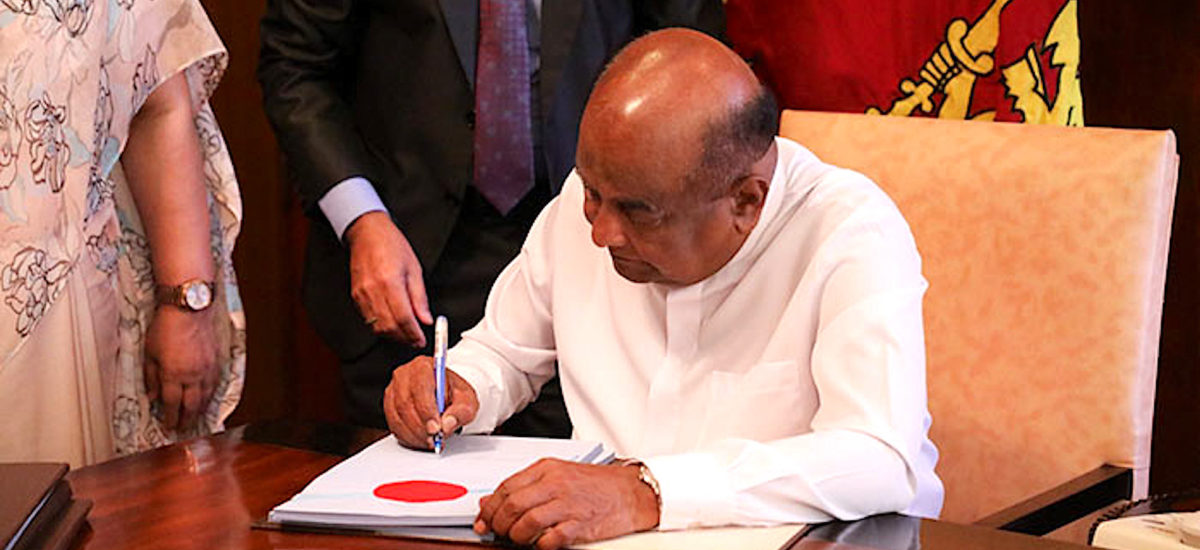Photo courtesy of Onlanka
The publishing of ousted President Gotabaya Rajapaksa’s memoirs, almost predictably titled The Conspiracy to oust me from the presidency, provide an opportunity to reevaluate those tumultuous events that did led to the fleeing abroad of the former president in 2022 and his resignation including the political discourse that arose from the aragalaya. The political discourse of the aragalaya is relevant, as we come to the constitutionally mandated presidential election year of 2024. If indeed the ouster of Gotabaya Rajapaksa was not a widely popular move and rather a conspiracy, foreign or otherwise, then the evidence would be obvious at the polls, where the Rajapaksas’ SLPP candidate should romp home to victory.
This has been the case in two other Asian countries with similar socio-religious backgrounds as ours – Thailand and Myanmar. Whenever the popularly elected governments of the red shirt political movement of Thakshin Shinawatra and his clan have been ousted through street protests, they have won the next free election. Similarly in Myanmar, when the Burmese military dared to face the public in a free election, they have been wiped out at the polls and the National League for Democracy (NLD) of Aung San Sui Kyi have emerged victorious. If the ousting of Gotabaya Rajapaksa was a conspiracy in 2022, then the vindication should occur at the 2024 polls, presidential and parliamentary. However, all indications of published opinion surveys indicate a near complete repudiation at the polls for the Rajapaksas. The SLPP is unlikely to run their own candidate at the presidential elections (after all there is no legal bar for Gotabaya Rajapaksa to contest again and seek vindication at the polls) and they are also likely to fare quite poorly at an ensuing general election as well. This is not a conspiracy but the political reality after bankrupting the country.
The Ranil Wickremesinghe Administration and the business and political elites who support it would argue the primacy of the economic recovery efforts. But this has already occurred. It was also not rocket science, just plain common sense of basically importing fuel with some help from India and renegotiating with our creditors including getting China to the table. But rebuilding the nation and its political economy requires deeper reforms. Even in the very throes of the economic collapse, the aragalaya was arguing for a system change, deep and fundamental reforms to the state including our identity based politics and culture of poor governance. While the Wickremesinghe Administration has taken the emergency measures to stabilize the economy, it is seemingly unwilling, unable and even in denial of the need for any reforms of the state, public governance or economic management. The long term solution is seen as increased foreign remittances from tourism and little else and business as usual. But the pain in society is deep and real and the election results of 2024 would reveal that.
The need for system change has been brought into stark focus by the vote of no confidence on the speaker of parliament brought by the opposition, a move catalyzed by the Leader of the Opposition Sajith Premadasa. The debate has been scheduled but not yet begun. Given the government’s comfortable majority in parliament, the outcome of the vote is in little doubt but from a public governance standpoint, what the opposition alleges in its no confidence motion seems self-evident and has not been refuted with any credibility.
The first and most serious allegation in the no confidence motion on the speaker is the process of passing and certifying the supremely misnamed Online Safety Bill, the government’s tool to crush online dissent. One wonders as to whose agenda this crackdown on civil liberties, basic freedoms and democratic norms is. If the Wickremesinghe Administration’s agenda is ever accused of being neo-liberal, it must surely be strictly limited to its economic policies since there is nothing liberal, tolerant or pluralistic on the crackdown on dissent and freedoms being done through the Online Safety Bill, the Counter Terrorism Act and other similar initiatives. The contention of the opposition’s motion is that the undertakings given to Supreme Court by the Attorney General, on behalf of the government were not adhered to by the government in the passage of the Bill. The necessary amendments were not incorporated and the division by name, although requested, was not conducted. If the youth of the aragalaya in 2022 were demanding system change and reforms, this is unlikely a conspiracy as Gotabaya Rajapaksa alleges but a rather obvious response to public governance, post war, where far from a peace dividend either economically or socio-politically, we went in the opposite direction to being less prosperous economically and less democratic with fewer liberties politically.
The appointment of the IGP was the second allegation in the no confidence motion against the speaker. In what is surely a slap in the face for the judiciary, a man found by the Supreme Court to have personally tortured a person in custody was soon thereafter nominated for IGP and, notwithstanding resistance from the Constitutional Council, appointed through the speaker’s casting vote. The process is now a part of the parliamentary no confidence motion. This administration, although a lame duck and lacking a popular mandate, is certainly not averse to audacious acts in governance. The aragalaya’s cry for real reform was no conspiracy and the results of the presidential and parliamentary elections due in the not too distant future will likely bear that out.

